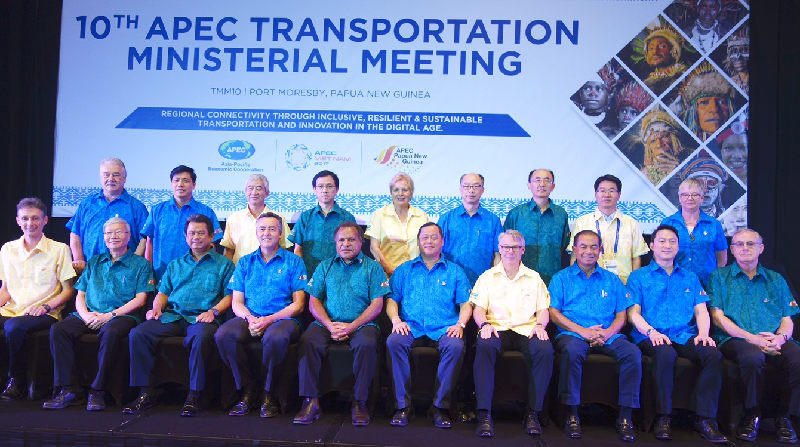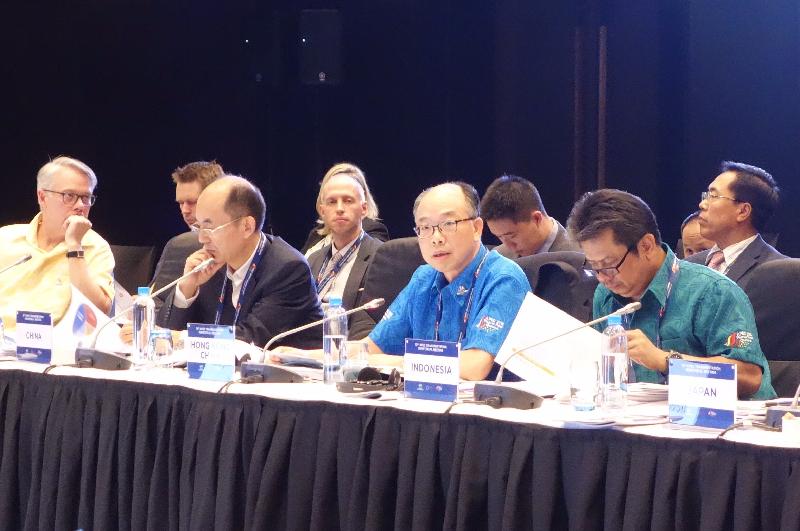Speaking points by STH on HK's transport infrastructure public-private partnership at panel session at 10th APEC Transportation Ministerial Meeting (English only) (with photos)
******************************************************************************************
Honourable Minister Nukundj, Moderator Ms Pearson, fellow ministers and heads of delegation, ladies and gentlemen. We come from different countries but together we are one. We share a common vision of having safe, green and sustainable transportation systems that are conducive to growth and connectivity. I would like to share my two cents on Hong Kong, China's decades of experience in Public Private Partnership (or "PPP" in short) for transportation systems.
Hong Kong has been ranked the freest economy for 23 consecutive years by the Heritage Foundation. Apart from our conviction to the rule of law and free trade, we have built over the decades a robust financial system, a highly efficient public service, and of course, top-notch infrastructure. Essential transport, power and communication networks create the necessary conditions for businesses to grow and the wider economy to prosper. Hong Kong tops the infrastructure pillar for the eighth time according to the Global Competitiveness Report 2017-18 published by the World Economic Forum.
With the growing population and economic development, moving people and goods around a compact city like Hong Kong is an on-going challenge. A well-developed, and sustainable transport infrastructure is of vital importance.
As a matter of policy, public transport has been the prime people mover in Hong Kong. At present, our public transport accounts for 90 per cent passenger share, with some 12 million passenger trips each day. Railway is the backbone of Hong Kong's public transport system, which accounts for over 40 per cent of all passenger trips made on public transport.
Our planning vision is to have half of our residential buildings and over three quarters of commercial offices within the reach of 500m from a nearby railway station. By then, 50 per cent of all passenger trips will be serviced by our railway network.
Hong Kong's railways are run by the MTR Corporation Limited (MTR). The network carried nearly 2 billion passenger-trips in 2016, with train services on schedule 99.9 per cent of the time. Just a few months ago, the MTR was named by the Fortune Magazine among the top 50 global institutions that "Change the World". Apart from Hong Kong, MTR is also operating in Melbourne, Sydney, Stockholm, London and in many cities of the Mainland (China).
Railway projects require intensive capital investment. Over the years, Hong Kong has been implementing railway projects through public private partnerships. Our experience reveals that a range of benefits transpires from successful PPPs.
First and foremost: economic efficiency. As the private sector has complete responsibility for the design, build, maintenance, and operation of a service, it is best positioned to optimise the design for economy and efficiency. Such optimisation is less likely to be achieved using conventional approaches where design, construction, maintenance and operation are undertaken by different entities.
Secondly, the private sector is engaged for the delivery of a service, rather than merely the construction of the hardware. The private sector is fully incentivized to achieve timely completion of the project, and adopt innovative practices in both its construction and operation.
Thirdly, PPPs allow both the public and private sectors to do what they are best for. Government's core competence is best for identifying public needs and crafting public policies and objectives, and therefore defining the service requirements and desired outcomes. The private sector is often better equipped to actually provide services – ranging from construction, maintenance and day-to-day operations.
Hong Kong has been implementing railway projects through public private partnerships under two approaches, namely the ownership approach and the concession approach. Under the ownership approach, railway corporations are responsible for the funding, design, construction, operation and maintenance, and ultimately own the railway. The Government is responsible for the strategic planning while the MTR responsible for the detailed project implementation.
To fill the funding gap, the Government provides support in different forms, including the granting of property development rights, which is often termed as the Rail-plus-Property development model. This arrangement helps smoothen the interface between stations, depots and topside developments to ensure timely completion of the railway project. It also helps harmonize property and railway development, thereby minimizing disturbance to residents and passengers alike. The grant of property development right will not only help bridge the funding gap, but also increase the patronage of the railway project in question. Such arrangement will in turn improve the viability of the railway project. When there is a lack of suitable sites along the railway alignment for property development, capital grant is given to bridge the funding gap.
As for the concession approach, the Government funds the construction of the railway and shares the operational risk of the project. In return, the ownership of the railway rests with the Government. Upon completion of the railway, the Government grants the operating right to a railway corporation and receives service concession payments thereafter.
The concession approach was adopted, for example, for the Hong Kong Section of the Guangzhou-Shenzhen-Hong Kong Express Rail Link, or XRL in short. This is our first high-speed rail link, linking Hong Kong to the Mainland's national high speed rail network. XRL is a cross-boundary infrastructure. As such, ownership of the XRL by the Government would facilitate coordination and resolution of interface issues between Hong Kong and Mainland counterparts, both during construction and operation.
In the long run, we will be able to capture the upside of the XRL's performance under a revenue sharing mechanism, and could get back a fully operational high-speed rail system upon expiry of the service concession. Apart from railway projects, many infrastructure projects such as cross-harbor tunnels and road tunnels, as well as convention and exhibition centres in Hong Kong had been built through PPP.
PPP appears in all shapes and sizes. Apart from consideration in respect of economic, efficiency, innovation, and operational outcome, the form of contract, social and political aspects could also come into play.
After all, PPP is a possible solution but not a panacea. A Mckinsey study published last year estimated that infrastructure investment worldwide would require US$3.3 trillion each year from now until 2030 in order to sustain current growth rates. That's why the forum today that foster exchange of experience and insight among APEC economies is most timely. Thank you again to Papua New Guinea for hosting the 10th Transportation Ministerial Meeting and in putting together the sharing sessions today. Thank you.
Ends/Saturday, October 7, 2017
Issued at HKT 15:00
Issued at HKT 15:00
NNNN




